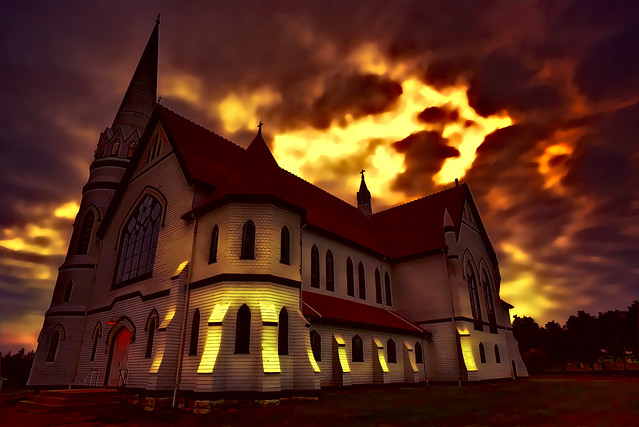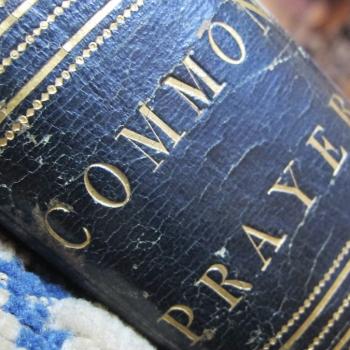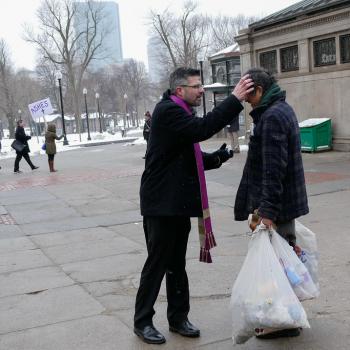
Opening Sentences
I think that one of the things that bothers me the most about so much of contemporary Christian worship is it’s ugly. It’s just ugly. I don’t get why it attracts people. I don’t get it. And I worry about souls that, and I know this sounds terrible, that are so superficial they’re attracted to that form of worship. I mean, I can’t imagine. You can only be taken in by it if you want to avoid recognizing the terror and the unbelievable tragedy that surrounds us. I mean, we live in an ugly world. I don’t mean that that means you need a lot of Rembrandt hanging around and that sort of thing. I think of a Quaker meeting house as extraordinarily beautiful, and the people are beautiful. It’s that that it seems to me we need to work really hard to articulate for ourselves.
One of the things I don’t like about the church growth movement, is how it creates a very homogenious congregation of approximately the same ages, and I think that has to do with the worship being fundamentally a form of entertainment, in which the congregation doesn’t do any work. I mean, liturgy is the work of the people. The Greeks meant, “Oh you’re digging a trench for water,” that you do together. That was liturgy. When the congregation is not part of the work of prayer, that’s the heart of the liturgical life, then something has desperately gone wrong.
When you have to keep coming up with variety in the name of attracting new people all the time, God, what a terrible treadmill that must be to be on. And when the sermon is primarily a thought just to keep you entertained, rather than for you to receive it as part of the work of the congregation, then, you know, if you compete with television, television in the end is going to win because it’s so good at what it does. The liturgy has got to be a real alternative to that, and if it is, then it will be in a certain sense more entertaining than television, because it will pull us out of our everyday presumptions that we know what it is we need and want.
– Stanley Hauerwas, from The Work of the People
An Ugly Meditation
He’s right. It’s an ugly world.
Yes, it’s an ugly world.
It’s ugly everywhere, but I think there’s a specific problem in the American church in that we don’t realize how ugly things are. We all remember the tragedy of 9/11, where about 3,000 people died, and yes, it was unspeakable tragedy. We remember that more than 4,000 U.S. soldiers have died in the Iraq War, and that is another unspeakable tragedy. But we forget about some of the things going on over on the other side of the world that are happening to other, non-American people. Like the 100,000 plus Iraqi civilians that have been “collateral damage” as the two sides couldn’t find a way to turn the other cheek.
The American church doesn’t get the tragedy, either. We think we’re oppressed because the checker at Piggly Wiggly wishes us “Happy Holidays” or because the law doesn’t define marriage like some of us want. But even in 2016, there are places where being a Christian could cost you your life. We are told of the rising Christian martyr deaths going on around the world, and so many of us are all up in arms about there being a nativity scene on every courthouse lawn.
When I was at Baylor, Tony Campolo told a packed chapel audience that “30,000 children died last night of malnutrition, and you don’t give a shit about it. What’s worse, you care more about the fact I said ‘shit’ than the fact that 30,000 kids died last night.” Case in point. There is tragedy all around us, but we’re busy bowing down at the altars of good behavior and politeness.
Hopefully, the car wreck of a presidential campaign and its aftermath will help us begin to see the stark terror happening around us every day. It’s time to be scared, church.
Hauerwas says being a Christian should just scare the hell out of us. That may be the problem. It just doesn’t scare the hell out of us. We just don’t feel vulnerable. And in those rare occasions when we do feel vulnerable, we find ourselves righteously indignant about having to feel vulnerable, as if we as Ameri-Christians have the unalienable, jesusy right to feel safe, warm, and happy in a society that likes us and treats us like we’re special.
When you’re not scared, and you don’t feel vulnerable, you don’t think about finding safety. You think about being as happy and comfortable as possible. Then something else happens, something which may not cost you your life, but that is highly toxic to your soul: you fall in love with the right to choose.
[Enter commercial Christian worship.]
Yes, it’s an ugly world.
What a strange thing it is that we mimic a part of that ugliness in the attempt to bloat our churches. So many of us have bought into a pseudo-evangelistic model that says you get the butts in the seats with the best entertainment you can afford, the kind that just might make them turn of the TV and get their butts to church, so you can bait and switch them with the gospel.
Liturgy, schmiturgy. Who wants to do work? On a Sunday, no less.
Responsive Reading
Frankly, we in the traditional church have done a terrible job of responding.
Instead of being ourselves, holding on to our liturgy and mission as the faux Christian facade of American culture crumbles, we’ve let panic set in. We’re shrinking. Steeples are falling. Parishes are closing. People don’t want to come to church and do work.
But if we can speak to them in an entertainment language, if we market ourselves as cool and trendy and hip, if we can convince them we’re some kind of different church, that we’re not as boring as the churches down the street, maybe we can eke out a few more good years. Maybe then we can keep the paint from peeling and the A/C running and feel good about the “ministry” we’re doing.
It seems to work.
After all, when people are given a choice between working to grow and raise their own food and the quick, easy carbs from McDonald’s, the masses will choose McDonald’s every time.
Every. Single. Time.
The gospel isn’t ugly, of course. It’s exceedingly beautiful. It’s a distinct alternative, a different way of living , a completely different economy. Gathered worship should reflect that. In fact, it should be a weekly retelling of that beautiful gospel in Word and Sacrament.
But instead of risking being labeled as “uncool” or “lame” or “boring,” we try to reinvent ourselves continuously, so that people might like us and want to come see us instead of the massive McCongregation down the street. And in doing so, we give up the things that made us alternative to begin with.
So, as Hauerwas noted, we find ourselves on a consumeristic treadmill, always having to be brighter and shinier and more stimulating. In the end, of course, TV will win. Football will win. Weekend trips will win. People will move on to the next thing, to the brighter, shinier, more distracting object. And the rest of us will be left with worship that doesn’t prepare us to carry the beauty of the gospel out into the ugly, crowded ways of life.
You can’t fight ugliness with more ugliness.
It’s at this point the comments usually start coming in. “How dare you judge the way people worship?” “It’s funny that you say it’s not about preferences, but then you say everyone should be doing it your way.”
Let me be clear.
Not every congregation must look exactly the same.
I don’t want everyone to worship just like me.
But in the historic pattern of liturgy, we find the antivenin for painful bite of ugliness.
Entertainment worship is the church’s underhanded marketing scheme.
Liturgy is the church’s beautiful alternative to ugliness.
A Beautiful Benediction
The Word and Sacrament should be front and center. We should wrestle with Holy Scripture together, instead of self-help pop psychology pulpits and trendy topical sermon series. There should be very little time for passive listening. And, of course, instead of letting people come veg out and gorge ourselves on the simple carbs of jesusy entertainment, we should give them a job to do, a part to play, a song to sing, a script to follow.
Will our congregations shrink? Some will, some won’t. But in time, if we maintain the lex orandi, lex credendi relationship between our gathered worship (liturgy) and the rest of our worship (life stuff), we might have a few epiphanies.
Maybe we will begin to realize how ugly the world actually is.
How we should have the hell scared out of us on a daily basis.
How vulnerable we really are when we take the gospel out into the ugliness around us.
How we desperately need our Sunday asylum.
Entertainment is always optional. Remember that. It breeds non-commitment.
The church’s worship is so much more.
And then, instead of multiplying the ugliness, we can go out from our asylum to proclaim the alternative beauty of the gospel as far as the curse is found.
















